Unit 7 Happy birthday 知识梳理-2025-2026学年七年级英语上册新课标(核心素养)同步大师课堂(人教版2024)
文档属性
| 名称 | Unit 7 Happy birthday 知识梳理-2025-2026学年七年级英语上册新课标(核心素养)同步大师课堂(人教版2024) | 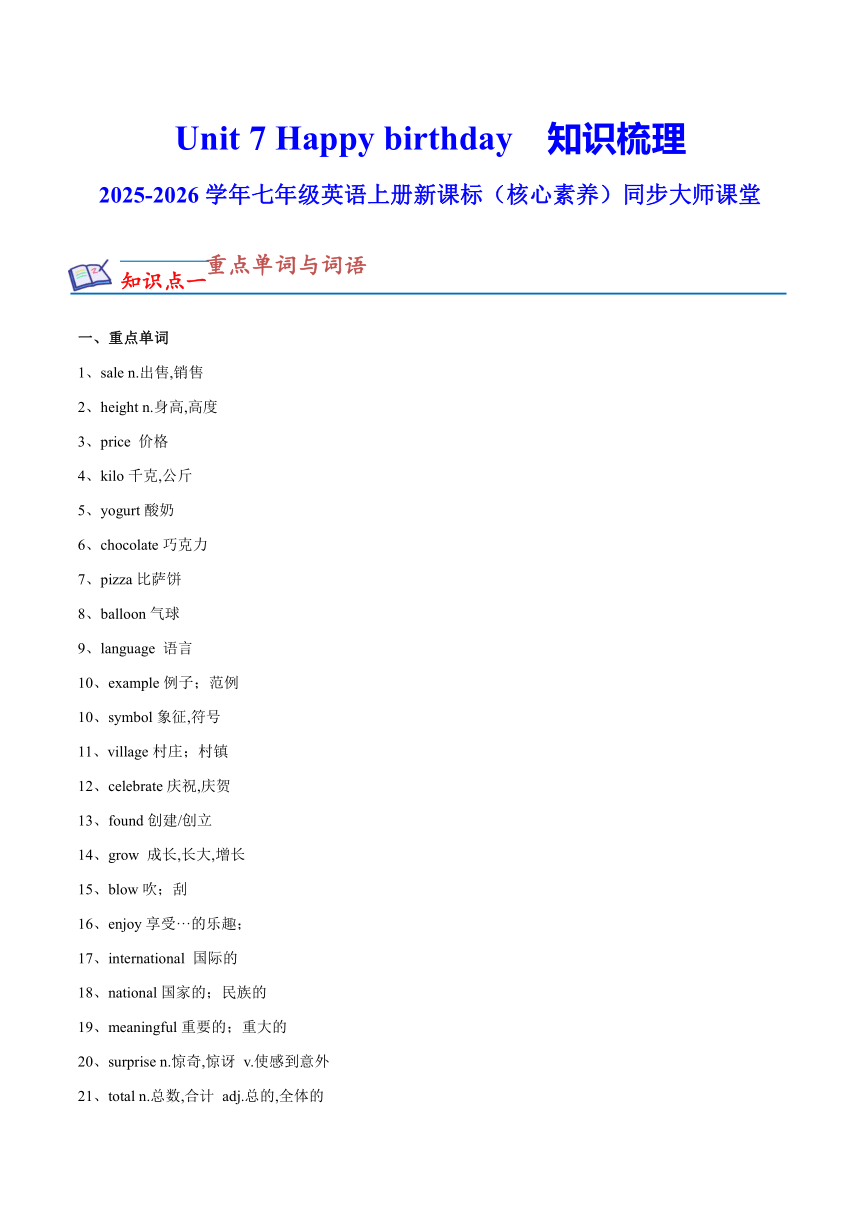 | |
| 格式 | docx | ||
| 文件大小 | 297.5KB | ||
| 资源类型 | 教案 | ||
| 版本资源 | 人教版 | ||
| 科目 | 英语 | ||
| 更新时间 | 2025-07-17 17:04:31 | ||
图片预览

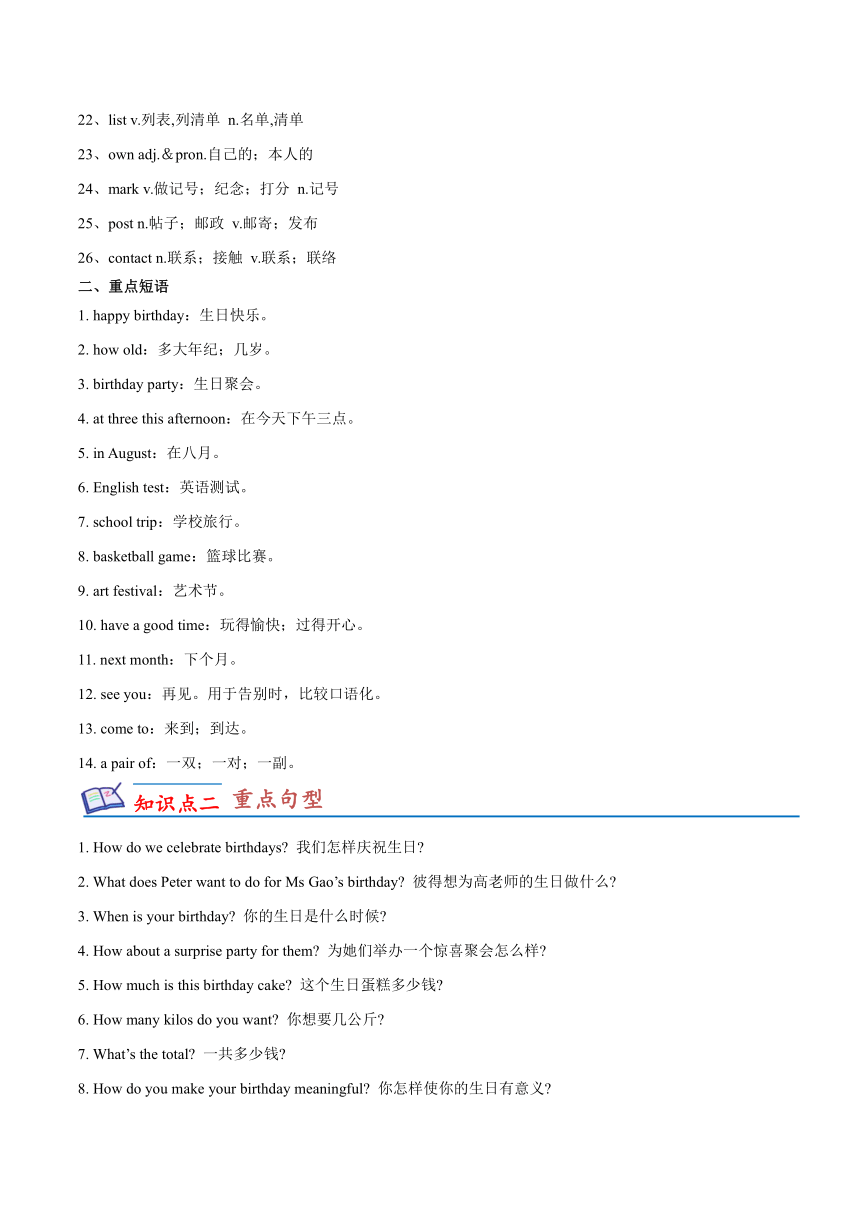
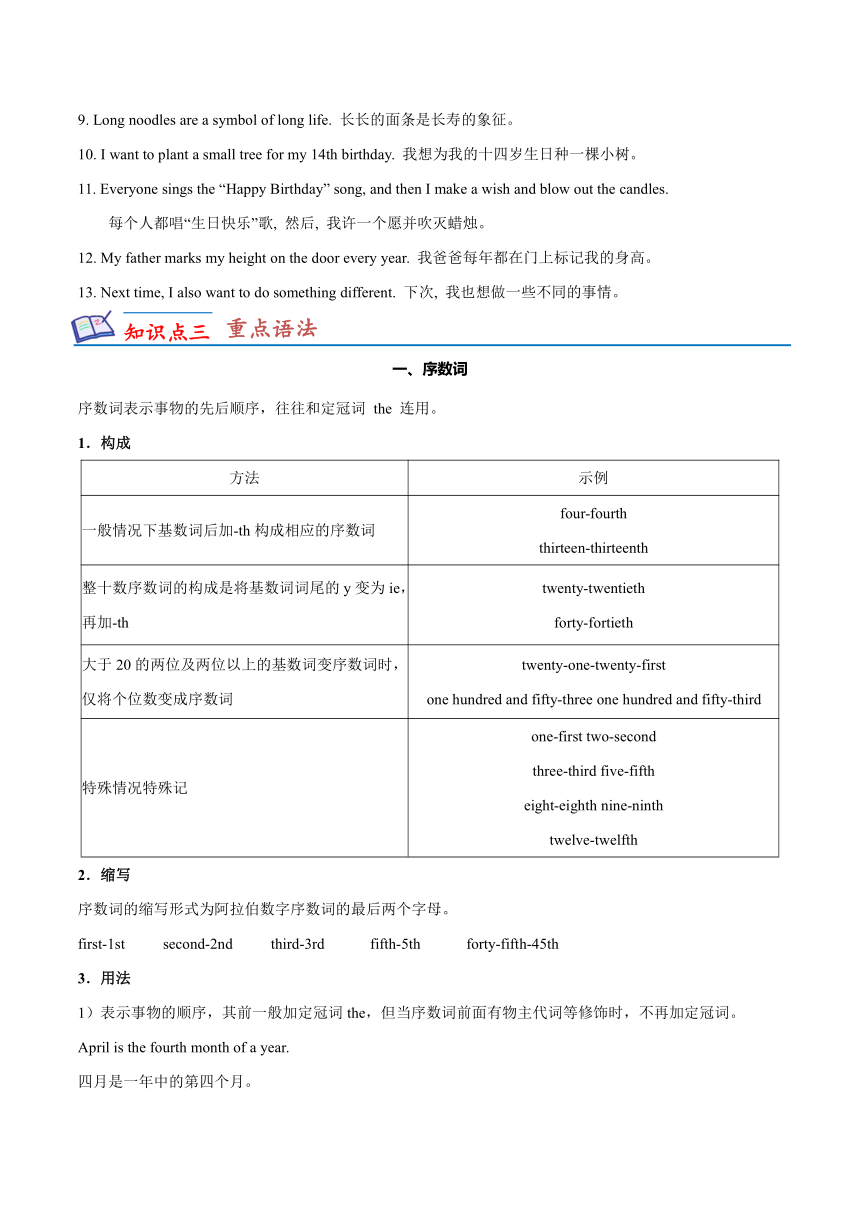
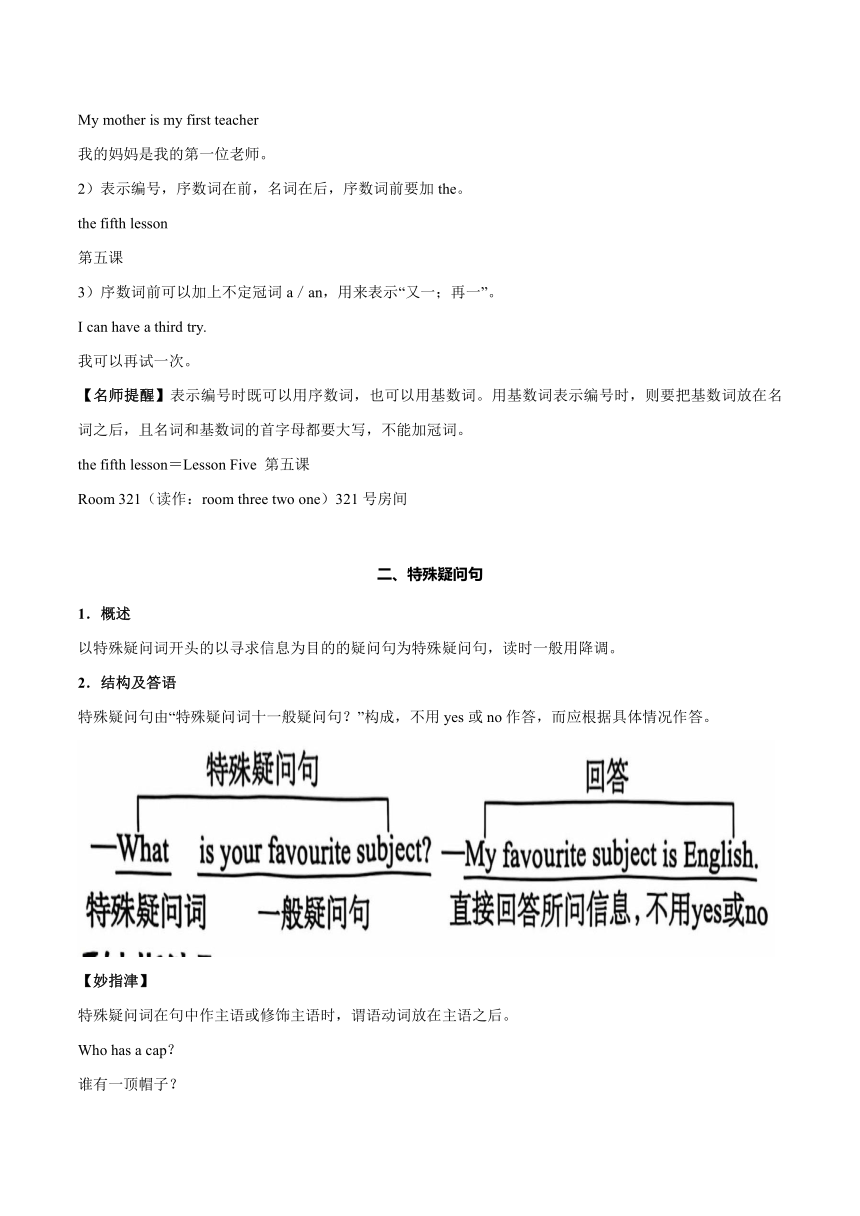
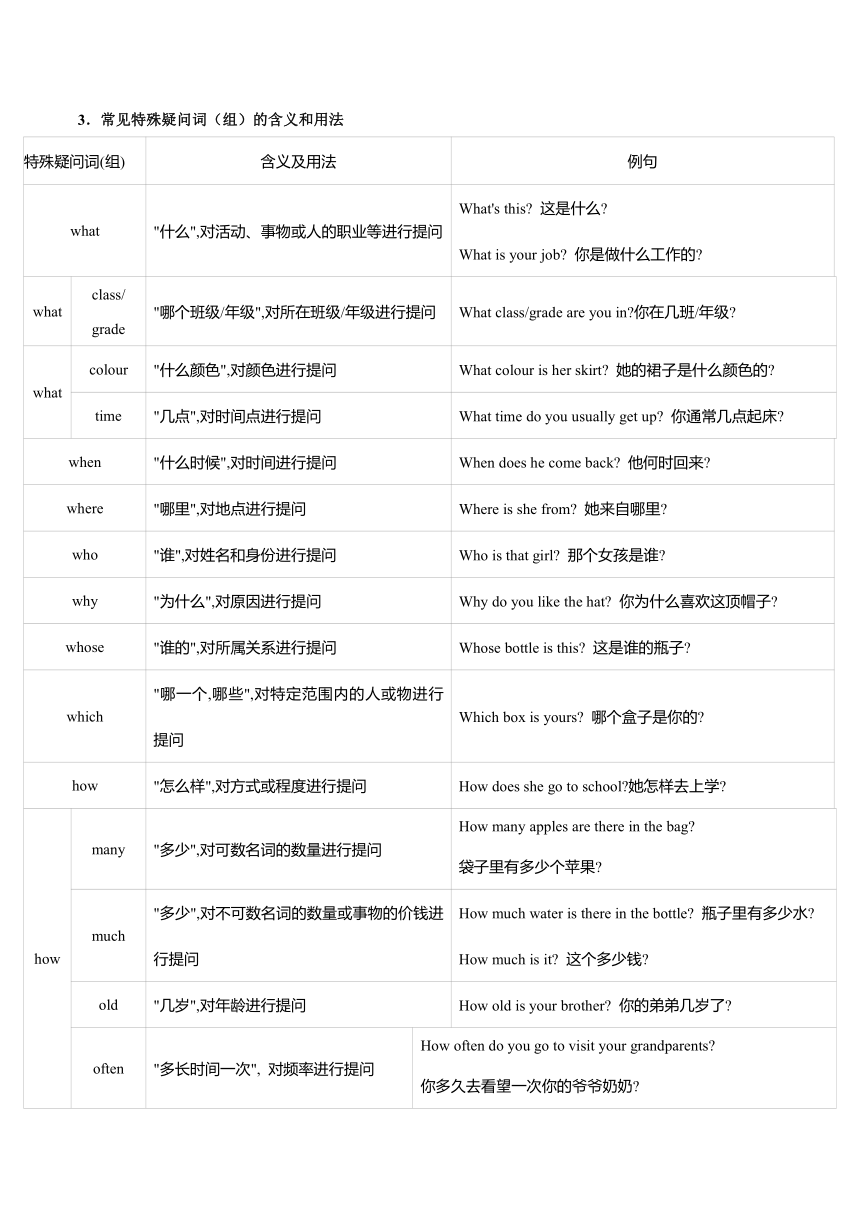
文档简介
Unit 7 Happy birthday 知识梳理
2025-2026学年七年级英语上册新课标(核心素养)同步大师课堂
(
重点单词与词语
) (
知识点一
)
一、重点单词
1、sale n.出售,销售
2、height n.身高,高度
3、price 价格
4、kilo千克,公斤
5、yogurt酸奶
6、chocolate巧克力
7、pizza比萨饼
8、balloon气球
9、language 语言
10、example例子;范例
10、symbol象征,符号
11、village村庄;村镇
12、celebrate庆祝,庆贺
13、found创建/创立
14、grow 成长,长大,增长
15、blow吹;刮
16、enjoy享受···的乐趣;
17、international 国际的
18、national国家的;民族的
19、meaningful重要的;重大的
20、surprise n.惊奇,惊讶 v.使感到意外
21、total n.总数,合计 adj.总的,全体的
22、list v.列表,列清单 n.名单,清单
23、own adj.&pron.自己的;本人的
24、mark v.做记号;纪念;打分 n.记号
25、post n.帖子;邮政 v.邮寄;发布
26、contact n.联系;接触 v.联系;联络
二、重点短语
1. happy birthday:生日快乐。
2. how old:多大年纪;几岁。
3. birthday party:生日聚会。
4. at three this afternoon:在今天下午三点。
5. in August:在八月。
6. English test:英语测试。
7. school trip:学校旅行。
8. basketball game:篮球比赛。
9. art festival:艺术节。
10. have a good time:玩得愉快;过得开心。
11. next month:下个月。
12. see you:再见。用于告别时,比较口语化。
e to:来到;到达。
(
知识点二
) (
重点句型
)14. a pair of:一双;一对;一副。
1. How do we celebrate birthdays 我们怎样庆祝生日
2. What does Peter want to do for Ms Gao’s birthday 彼得想为高老师的生日做什么
3. When is your birthday 你的生日是什么时候
4. How about a surprise party for them 为她们举办一个惊喜聚会怎么样
5. How much is this birthday cake 这个生日蛋糕多少钱
6. How many kilos do you want 你想要几公斤
7. What’s the total 一共多少钱
8. How do you make your birthday meaningful 你怎样使你的生日有意义
9. Long noodles are a symbol of long life. 长长的面条是长寿的象征。
10. I want to plant a small tree for my 14th birthday. 我想为我的十四岁生日种一棵小树。
11. Everyone sings the “Happy Birthday” song, and then I make a wish and blow out the candles.
每个人都唱“生日快乐”歌, 然后, 我许一个愿并吹灭蜡烛。
12. My father marks my height on the door every year. 我爸爸每年都在门上标记我的身高。
(
重点语法
) (
知识点三
)13. Next time, I also want to do something different. 下次, 我也想做一些不同的事情。
一、序数词
序数词表示事物的先后顺序,往往和定冠词 the 连用。
构成
方法 示例
一般情况下基数词后加-th构成相应的序数词 four-fourth thirteen-thirteenth
整十数序数词的构成是将基数词词尾的y变为ie,再加-th twenty-twentieth forty-fortieth
大于20的两位及两位以上的基数词变序数词时,仅将个位数变成序数词 twenty-one-twenty-first one hundred and fifty-three one hundred and fifty-third
特殊情况特殊记 one-first two-second three-third five-fifth eight-eighth nine-ninth twelve-twelfth
2.缩写
序数词的缩写形式为阿拉伯数字序数词的最后两个字母。
first-1st second-2nd third-3rd fifth-5th forty-fifth-45th
3.用法
1)表示事物的顺序,其前一般加定冠词the,但当序数词前面有物主代词等修饰时,不再加定冠词。
April is the fourth month of a year.
四月是一年中的第四个月。
My mother is my first teacher
我的妈妈是我的第一位老师。
2)表示编号,序数词在前,名词在后,序数词前要加the。
the fifth lesson
第五课
3)序数词前可以加上不定冠词a/an,用来表示“又一;再一”。
I can have a third try.
我可以再试一次。
【名师提醒】表示编号时既可以用序数词,也可以用基数词。用基数词表示编号时,则要把基数词放在名词之后,且名词和基数词的首字母都要大写,不能加冠词。
the fifth lesson=Lesson Five 第五课
Room 321(读作:room three two one)321号房间
二、特殊疑问句
1.概述
以特殊疑问词开头的以寻求信息为目的的疑问句为特殊疑问句,读时一般用降调。
2.结构及答语
特殊疑问句由“特殊疑问词十一般疑问句?”构成,不用yes或no作答,而应根据具体情况作答。
【妙指津】
特殊疑问词在句中作主语或修饰主语时,谓语动词放在主语之后。
Who has a cap?
谁有一顶帽子?
3.常见特殊疑问词(组)的含义和用法
特殊疑问词(组) 含义及用法 例句
what "什么",对活动、事物或人的职业等进行提问 What's this 这是什么 What is your job 你是做什么工作的
what class/ grade "哪个班级/年级",对所在班级/年级进行提问 What class/grade are you in 你在几班/年级
what colour "什么颜色",对颜色进行提问 What colour is her skirt 她的裙子是什么颜色的
time "几点",对时间点进行提问 What time do you usually get up 你通常几点起床
when "什么时候",对时间进行提问 When does he come back 他何时回来
where "哪里",对地点进行提问 Where is she from 她来自哪里
who "谁",对姓名和身份进行提问 Who is that girl 那个女孩是谁
why "为什么",对原因进行提问 Why do you like the hat 你为什么喜欢这顶帽子
whose "谁的",对所属关系进行提问 Whose bottle is this 这是谁的瓶子
which "哪一个,哪些",对特定范围内的人或物进行提问 Which box is yours 哪个盒子是你的
how "怎么样",对方式或程度进行提问 How does she go to school 她怎样去上学
how many "多少",对可数名词的数量进行提问 How many apples are there in the bag 袋子里有多少个苹果
much "多少",对不可数名词的数量或事物的价钱进行提问 How much water is there in the bottle 瓶子里有多少水 How much is it 这个多少钱
old "几岁",对年龄进行提问 How old is your brother 你的弟弟几岁了
often "多长时间一次", 对频率进行提问 How often do you go to visit your grandparents 你多久去看望一次你的爷爷奶奶
tall "多高",对高度进行提问 How tall is the building 这个建筑物多高
long "多长/多久",对长度或时间段进行提问 How long is the bridge 这座桥多长 How long does it take you to walk to school every day 你每天步行上学需要多长时间
far "多远",对距离进行提问 How far is it from your home to the post office 你家离邮局多远
特殊疑问句的答语
回答特殊疑问句时不能用yes 或no,而要针对问题进行回答,即问什么答什么。回答时可用一个词或短语,也可用一个完整的句子。
—How old are you 你几岁了
—I'm thirteen. 我十三岁了。
—Who always gets to school early 谁总是提早到学校
(
重点知识
)—Henry.亨利。
(
知识点四
)
1、Why do we celebrate birthdays?我们为什么要庆祝生日?
celebrate[动词]庆祝;庆贺
celebrate 既可以作及物动词也可以作不及物动词。
How do people celebrate New Year in your country
你们国家的人怎样庆贺新年?
It's your birthday tomorrow, so we must celebrate.
明天是你的生日,所以我们必须庆祝。
【拓展】celebration[名词]庆典;庆祝活动
Her birthday celebration is on 8th January. 她的生日庆典在1月8日。
2、How old is Helen?海伦多大了?
How old...?“······多大了?”
用来询问年龄。其结构为“How old +be动词+主语?”,表示“······多大年纪?/······几岁了?”,答语常用“主语+be动词+基数词+year(s)/month(s)old.”结构,也可以直接回答年龄。
-How old is your father?
你爸爸多大年纪了?
-He is forty years old./Forty.
他40岁了。/40岁。
【拓展】询问年龄的句型还有“What's sb's age?”。
How old are you =what’s your age?
你多大了?
3、It's on...在······
on[介词]在(某一天)
常与日期、星期搭配,表示在具体的某一天。
I usually visit my aunt on 1st May.
我通常在5月1日去看望我的姑姑。
He goes to Beijing on Monday.
他星期一去北京。
【辨析】on,in与 at
on 常用于日期前,表示具体的某一天,其后还可跟带有修饰词的或者具体某一天的上午、下午或晚上,如on a cold morning/ on the morning of 3rd July
in 常用于年、月前,也可用于一天中的上午、下午或者晚上前,如in 2022,in the morning
at 用于具体的时刻前,如at 5:00;也用于noon/ night / midnight等词前
4、How about a surprise party for them?给她们办个惊喜聚会怎么样?
surprise[名词]惊奇;惊讶
in surprise 惊讶地
to one's surprise 令某人惊讶的是
Bill looked at him in surprise.
比尔惊讶地看着他。
To my surprise, he likes the gift.
令我惊讶的是,他喜欢这个礼物。
【拓展】
①surprise[动词]使感到意外
The news surprised us.
这个消息使我们吃惊。
②surprised[形容词](感到)惊讶的
be surprised at...对······感到惊讶
We are surprised at his success.我们对他的成功感到惊讶。
5、Let's go and buy something for the party.我们去为聚会买些东西吧。
something[代词]某事;某物
是由“some+thing”构成的不定代词,常用于肯定句中,作主语时谓语动词用单数。形容词修饰不定代词时,位于不定代词之后。
Something is wrong with my bike.
我的自行车坏了。
I have something important to tell you.
我有重要的事情告诉你们。
【拓展】当希望得到对方的肯定回答时,something也可以用于疑问句中。
I'd like something to drink. Would you like something to eat?
我想要点喝的。你想要些吃的吗?
6、Can I help you?您想要买点什么吗?
Can I help you?是服务员主动询问顾客需要的常用语,但在不同语境中有不同的含义。
其肯定回答用“Yes,please.I'd like...”或直接回答“...,please.”;其否定回答用“No,thanks.”。
-Can I help you?您想吃点什么?
-Two hamburgers,please.请来两个汉堡包。(饭店里)
-Can I help you?您想要买什么?
-No, thanks. I am just looking around.没什么,谢谢。我只是随便看看。(商店里)
【深度学习】“Can I help you?”的三个同义句
May I help you
What can I do for you
Is there anything I can do for you
7、How much is this birthday cake?这个生日蛋糕多少钱?
How much...?“······多少钱?”;用来询问物品的价格。常用句式:
①“How much is+可数名词单数/不可数名词?”,答语为价格.”;
②“How much are+可数名词复数?”,答语为“(They're+)价格.”。
-How much are these pencils
这些铅笔多少钱?
-They're five yuan.
它们5元。
【拓展】how much还可以用来提问数量,后接不可数名词。
How much water is there in the glass
杯子里有多少水?
8、We have a sale today.我们今天打折。
sale[名词]出售;销售
sale是动词 sell的名词形式。
常用短语:
on sale正在出售;减价出售
for sale待售
Many clothes are on sale, but few fit me.
许多衣服在减价出售,但很少有适合我的。
This house is for sale.此房待售。
9、How much is the yogurt?酸奶多少钱?
yogurt[名词](=yoghurt)酸奶
不可数名词,若表示酸奶的量,常借助表示计量单位的词。询问酸奶的量,要用how much来提问。
I'd like two cups of yogurt.
我想要两杯酸奶。
【拓展】常见的其他与食物有关的不可数名词
honey 蜂蜜 salt 食盐 corn玉米 popcorn 爆米花 butter 黄油;奶油
10、Price 价格
price[名词]价格
常用短语:at a...price 意为“以······的价格”,the price of...意为“······的价格”。作主语时,谓语动词用单数。
They sell fruit at a good price.
他们以优惠的价格出售水果。
The price of this car is very high.
这辆车的价格非常高。
【拓展】
①询问物品的价格用“What's the price of...?”,可与“How much...?”相互转换,其答语为价格.”。
-What's the price of this pen =How much is this pen?
这支钢笔多少钱?
-(It's)6 yuan.(它)6元。
②表示价格高、低时,用high(高的)、low(低的),不用expensive(昂贵的)、cheap(便宜的)。
I sell the bike at a low price.
我低价出售这辆自行车。
【名师提醒】
在“What's the price of...?”句型中,of后无论是可数名词复数还是不可数名词,be动词都用is。
11、Shopping List 购物清单
list[名词]名单;清单
常用短语:
make a list(of...)列一张(······的)清单
on the list 在名单/清单上
a shopping list一张购物清单
a price list 价目表
Please make a list of all the things.
请把所有事情列个清单。
Do you see your name on the list
你在名单上看到你的名字了吗?
【拓展】list[动词]列表;列清单
Please list the things that you need to buy.
请列一下你需要买的东西.
12、We celebrate our own birthdays.我们庆祝自己的生日。
own[形容词]&[代词]自己的;本人的
own 常用于形容词性物主代词或名词所有格之后。与own相关的常见短语:
on one's own 独自地
of one's own属于某人自己的
She lives on her ovm.
她一个人生活。
They have no car of their owm.
他们没有自己的汽车。
【拓展】
①own[动词]拥有,有;尤其指买来的东西。
Do you own your house?
你有自己的房子吗?
②own的名词形式为owner,意为“物主;主人”。the owner of...意为“······的主人”。
She is the owner of the house.
她是这所房子的主人。
13、How do you make your birthday meaningful?你如何使你的生日有意义?
meaningful[形容词]重要的;重大的
He lives a happy and meaningful life.
他过着幸福而有意义的生活。
It is a meaningful experience.
这是一次有意义的经历。
【拓展】
mean v.意思是,意味着
meaning n.意思,意义
meaningful adj.重要的,重大的,有意义的
meaningless adj.毫无意义的,毫无目的的
14、Long noodles are a symbol of long life.长面条是长寿的象征。
symbol[名词]象征;符号
常用搭配:
a/the symbol of...······的象征
the symbol for...······的符号
Tai chi is a symbol of Chinese culture.
太极是中国文化的象征。
Fe is the chemical symbol for iron.
Fe是铁的化学符号。
15、I'd like to watch it grow with me.我想看着它和我一起成长。
grow[动词]成长;长大;增长
此处作不及物动词,常用搭配:
grow up 长大;成长
grow into...成长为······
Children grow up so fast these days.
如今孩子们长得真快。
The seeds will grow into new plants.
种子会长成新的植物。
【拓展】
①grow“种植;栽培”,作及物动词。
We always grow flowers in our garden.
我们总是在我们的花园里种花。
②grow“逐渐变得”,作系动词,强调变化过程。
It's growing dark.
天渐渐(变)黑了。
The leaves begin to grow yellow in the fall.
树叶在秋天开始变黄。
16、Everyone sings the "Happy Birthday" song, and then I make a wish and blow out the candles.每个人都唱“生日快乐”歌,然后我许愿,吹灭蜡烛。
1)make a wish 许愿
wish在此处作可数名词,意为“愿望;希望;心愿”。其复数形式为wishes,best wishes 常用来向对方表达“最美好的祝愿”。
I want to make a wish on my birthday.
我想在我生日那天许个愿望。
My wish is to become a doctor.
我的愿望是成为一名医生。
Please give my best wishes to your parents.
请代我向你的父母致以最美好的祝愿。
【拓展】wish[动词]希望;祝愿
常用结构:
Bill wishes to go shopping this afternoon.
比尔希望今天下午去购物。
My father wishes me to be a doctor.
我爸爸希望我成为一名医生。
Wish you success!
祝你成功!
2)blow out 吹灭
blow 作不及物动词,意为“吹;刮”。名词作宾语时,置于blow out之后或blow与out之间;代词作宾语时,要置于blow与out之间。
A strong wind blew out our fire.=A strong wind blew our fire out.
一阵大风吹灭了我们的火。
Look at the lighted matches! Let's blow them out.
看那些燃烧着的火柴!咱们把它们吹灭吧。
17、Next, we enjoy the cake, and I open all my gifts.接下来,我们享用蛋糕,我打开我所有的礼物。enjoy[动词]享受······的乐趣;喜欢
enjoy后跟名词、代词或动词-ing形式,不接动词不定式。
Jim enjoys the song a lot.
吉姆很喜欢这首歌曲。
Lucy enjoys swimming very much.
露西非常喜欢游泳。
18、My father marks my height on the door every year.It's fun to look at the marks later.我爸爸每年都在门上标出我的身高。后来再看这些标记很有趣。
1)mark[动词]做记号;纪念;打分[名词]记号
His job is to mark lines on roads.
他的工作是在道路上画标记。
It marks the birthday of Florence Nightingale, a famous nurse.
它是为了纪念著名护士弗洛伦斯·南丁格尔的生日。
Our teacher has a lot of exam papers to mark.
我们老师有很多试卷要打分。
I usually put marks on the beautiful sentences.
我通常会在优美的句子上做记号。
【拓展】mark[名词]分数常用短语:
get good marks 取得好成绩
get bad marks 成绩不好
My friend Chen Yi always gets good marks.
我的朋友陈艺总是取得好成绩。
2)height[名词]身高;高度
其形容词是high,意为“高的”。height的常见搭配:
at a height of...在······的高度
in height 在高度上
That village is at a height of 3,000 metres.
那个村庄位于海拔3000米的地方。
It is almost 2 metres in height.
它差不多2米高。
【拓展】
询问某物的高度或某人的身高常用“How tall...?”,也可用“What's the height of...?”,后者较为正式。
How tall is Jimmy?
吉米多高?
What's the height of that building
那栋楼的高度是多少?
3)later[副词]&[形容词]以后(的);后来(的)
可单独使用,也可以构成固定搭配:“时间段+later”意为“······以后”;later on意为“后来;稍后”。
A month later,Sandy will leave for Kansas.
一个月以后,桑迪将动身前往堪萨斯州。
I'll call you back later on.
稍后我给你回电话。
2025-2026学年七年级英语上册新课标(核心素养)同步大师课堂
(
重点单词与词语
) (
知识点一
)
一、重点单词
1、sale n.出售,销售
2、height n.身高,高度
3、price 价格
4、kilo千克,公斤
5、yogurt酸奶
6、chocolate巧克力
7、pizza比萨饼
8、balloon气球
9、language 语言
10、example例子;范例
10、symbol象征,符号
11、village村庄;村镇
12、celebrate庆祝,庆贺
13、found创建/创立
14、grow 成长,长大,增长
15、blow吹;刮
16、enjoy享受···的乐趣;
17、international 国际的
18、national国家的;民族的
19、meaningful重要的;重大的
20、surprise n.惊奇,惊讶 v.使感到意外
21、total n.总数,合计 adj.总的,全体的
22、list v.列表,列清单 n.名单,清单
23、own adj.&pron.自己的;本人的
24、mark v.做记号;纪念;打分 n.记号
25、post n.帖子;邮政 v.邮寄;发布
26、contact n.联系;接触 v.联系;联络
二、重点短语
1. happy birthday:生日快乐。
2. how old:多大年纪;几岁。
3. birthday party:生日聚会。
4. at three this afternoon:在今天下午三点。
5. in August:在八月。
6. English test:英语测试。
7. school trip:学校旅行。
8. basketball game:篮球比赛。
9. art festival:艺术节。
10. have a good time:玩得愉快;过得开心。
11. next month:下个月。
12. see you:再见。用于告别时,比较口语化。
e to:来到;到达。
(
知识点二
) (
重点句型
)14. a pair of:一双;一对;一副。
1. How do we celebrate birthdays 我们怎样庆祝生日
2. What does Peter want to do for Ms Gao’s birthday 彼得想为高老师的生日做什么
3. When is your birthday 你的生日是什么时候
4. How about a surprise party for them 为她们举办一个惊喜聚会怎么样
5. How much is this birthday cake 这个生日蛋糕多少钱
6. How many kilos do you want 你想要几公斤
7. What’s the total 一共多少钱
8. How do you make your birthday meaningful 你怎样使你的生日有意义
9. Long noodles are a symbol of long life. 长长的面条是长寿的象征。
10. I want to plant a small tree for my 14th birthday. 我想为我的十四岁生日种一棵小树。
11. Everyone sings the “Happy Birthday” song, and then I make a wish and blow out the candles.
每个人都唱“生日快乐”歌, 然后, 我许一个愿并吹灭蜡烛。
12. My father marks my height on the door every year. 我爸爸每年都在门上标记我的身高。
(
重点语法
) (
知识点三
)13. Next time, I also want to do something different. 下次, 我也想做一些不同的事情。
一、序数词
序数词表示事物的先后顺序,往往和定冠词 the 连用。
构成
方法 示例
一般情况下基数词后加-th构成相应的序数词 four-fourth thirteen-thirteenth
整十数序数词的构成是将基数词词尾的y变为ie,再加-th twenty-twentieth forty-fortieth
大于20的两位及两位以上的基数词变序数词时,仅将个位数变成序数词 twenty-one-twenty-first one hundred and fifty-three one hundred and fifty-third
特殊情况特殊记 one-first two-second three-third five-fifth eight-eighth nine-ninth twelve-twelfth
2.缩写
序数词的缩写形式为阿拉伯数字序数词的最后两个字母。
first-1st second-2nd third-3rd fifth-5th forty-fifth-45th
3.用法
1)表示事物的顺序,其前一般加定冠词the,但当序数词前面有物主代词等修饰时,不再加定冠词。
April is the fourth month of a year.
四月是一年中的第四个月。
My mother is my first teacher
我的妈妈是我的第一位老师。
2)表示编号,序数词在前,名词在后,序数词前要加the。
the fifth lesson
第五课
3)序数词前可以加上不定冠词a/an,用来表示“又一;再一”。
I can have a third try.
我可以再试一次。
【名师提醒】表示编号时既可以用序数词,也可以用基数词。用基数词表示编号时,则要把基数词放在名词之后,且名词和基数词的首字母都要大写,不能加冠词。
the fifth lesson=Lesson Five 第五课
Room 321(读作:room three two one)321号房间
二、特殊疑问句
1.概述
以特殊疑问词开头的以寻求信息为目的的疑问句为特殊疑问句,读时一般用降调。
2.结构及答语
特殊疑问句由“特殊疑问词十一般疑问句?”构成,不用yes或no作答,而应根据具体情况作答。
【妙指津】
特殊疑问词在句中作主语或修饰主语时,谓语动词放在主语之后。
Who has a cap?
谁有一顶帽子?
3.常见特殊疑问词(组)的含义和用法
特殊疑问词(组) 含义及用法 例句
what "什么",对活动、事物或人的职业等进行提问 What's this 这是什么 What is your job 你是做什么工作的
what class/ grade "哪个班级/年级",对所在班级/年级进行提问 What class/grade are you in 你在几班/年级
what colour "什么颜色",对颜色进行提问 What colour is her skirt 她的裙子是什么颜色的
time "几点",对时间点进行提问 What time do you usually get up 你通常几点起床
when "什么时候",对时间进行提问 When does he come back 他何时回来
where "哪里",对地点进行提问 Where is she from 她来自哪里
who "谁",对姓名和身份进行提问 Who is that girl 那个女孩是谁
why "为什么",对原因进行提问 Why do you like the hat 你为什么喜欢这顶帽子
whose "谁的",对所属关系进行提问 Whose bottle is this 这是谁的瓶子
which "哪一个,哪些",对特定范围内的人或物进行提问 Which box is yours 哪个盒子是你的
how "怎么样",对方式或程度进行提问 How does she go to school 她怎样去上学
how many "多少",对可数名词的数量进行提问 How many apples are there in the bag 袋子里有多少个苹果
much "多少",对不可数名词的数量或事物的价钱进行提问 How much water is there in the bottle 瓶子里有多少水 How much is it 这个多少钱
old "几岁",对年龄进行提问 How old is your brother 你的弟弟几岁了
often "多长时间一次", 对频率进行提问 How often do you go to visit your grandparents 你多久去看望一次你的爷爷奶奶
tall "多高",对高度进行提问 How tall is the building 这个建筑物多高
long "多长/多久",对长度或时间段进行提问 How long is the bridge 这座桥多长 How long does it take you to walk to school every day 你每天步行上学需要多长时间
far "多远",对距离进行提问 How far is it from your home to the post office 你家离邮局多远
特殊疑问句的答语
回答特殊疑问句时不能用yes 或no,而要针对问题进行回答,即问什么答什么。回答时可用一个词或短语,也可用一个完整的句子。
—How old are you 你几岁了
—I'm thirteen. 我十三岁了。
—Who always gets to school early 谁总是提早到学校
(
重点知识
)—Henry.亨利。
(
知识点四
)
1、Why do we celebrate birthdays?我们为什么要庆祝生日?
celebrate[动词]庆祝;庆贺
celebrate 既可以作及物动词也可以作不及物动词。
How do people celebrate New Year in your country
你们国家的人怎样庆贺新年?
It's your birthday tomorrow, so we must celebrate.
明天是你的生日,所以我们必须庆祝。
【拓展】celebration[名词]庆典;庆祝活动
Her birthday celebration is on 8th January. 她的生日庆典在1月8日。
2、How old is Helen?海伦多大了?
How old...?“······多大了?”
用来询问年龄。其结构为“How old +be动词+主语?”,表示“······多大年纪?/······几岁了?”,答语常用“主语+be动词+基数词+year(s)/month(s)old.”结构,也可以直接回答年龄。
-How old is your father?
你爸爸多大年纪了?
-He is forty years old./Forty.
他40岁了。/40岁。
【拓展】询问年龄的句型还有“What's sb's age?”。
How old are you =what’s your age?
你多大了?
3、It's on...在······
on[介词]在(某一天)
常与日期、星期搭配,表示在具体的某一天。
I usually visit my aunt on 1st May.
我通常在5月1日去看望我的姑姑。
He goes to Beijing on Monday.
他星期一去北京。
【辨析】on,in与 at
on 常用于日期前,表示具体的某一天,其后还可跟带有修饰词的或者具体某一天的上午、下午或晚上,如on a cold morning/ on the morning of 3rd July
in 常用于年、月前,也可用于一天中的上午、下午或者晚上前,如in 2022,in the morning
at 用于具体的时刻前,如at 5:00;也用于noon/ night / midnight等词前
4、How about a surprise party for them?给她们办个惊喜聚会怎么样?
surprise[名词]惊奇;惊讶
in surprise 惊讶地
to one's surprise 令某人惊讶的是
Bill looked at him in surprise.
比尔惊讶地看着他。
To my surprise, he likes the gift.
令我惊讶的是,他喜欢这个礼物。
【拓展】
①surprise[动词]使感到意外
The news surprised us.
这个消息使我们吃惊。
②surprised[形容词](感到)惊讶的
be surprised at...对······感到惊讶
We are surprised at his success.我们对他的成功感到惊讶。
5、Let's go and buy something for the party.我们去为聚会买些东西吧。
something[代词]某事;某物
是由“some+thing”构成的不定代词,常用于肯定句中,作主语时谓语动词用单数。形容词修饰不定代词时,位于不定代词之后。
Something is wrong with my bike.
我的自行车坏了。
I have something important to tell you.
我有重要的事情告诉你们。
【拓展】当希望得到对方的肯定回答时,something也可以用于疑问句中。
I'd like something to drink. Would you like something to eat?
我想要点喝的。你想要些吃的吗?
6、Can I help you?您想要买点什么吗?
Can I help you?是服务员主动询问顾客需要的常用语,但在不同语境中有不同的含义。
其肯定回答用“Yes,please.I'd like...”或直接回答“...,please.”;其否定回答用“No,thanks.”。
-Can I help you?您想吃点什么?
-Two hamburgers,please.请来两个汉堡包。(饭店里)
-Can I help you?您想要买什么?
-No, thanks. I am just looking around.没什么,谢谢。我只是随便看看。(商店里)
【深度学习】“Can I help you?”的三个同义句
May I help you
What can I do for you
Is there anything I can do for you
7、How much is this birthday cake?这个生日蛋糕多少钱?
How much...?“······多少钱?”;用来询问物品的价格。常用句式:
①“How much is+可数名词单数/不可数名词?”,答语为价格.”;
②“How much are+可数名词复数?”,答语为“(They're+)价格.”。
-How much are these pencils
这些铅笔多少钱?
-They're five yuan.
它们5元。
【拓展】how much还可以用来提问数量,后接不可数名词。
How much water is there in the glass
杯子里有多少水?
8、We have a sale today.我们今天打折。
sale[名词]出售;销售
sale是动词 sell的名词形式。
常用短语:
on sale正在出售;减价出售
for sale待售
Many clothes are on sale, but few fit me.
许多衣服在减价出售,但很少有适合我的。
This house is for sale.此房待售。
9、How much is the yogurt?酸奶多少钱?
yogurt[名词](=yoghurt)酸奶
不可数名词,若表示酸奶的量,常借助表示计量单位的词。询问酸奶的量,要用how much来提问。
I'd like two cups of yogurt.
我想要两杯酸奶。
【拓展】常见的其他与食物有关的不可数名词
honey 蜂蜜 salt 食盐 corn玉米 popcorn 爆米花 butter 黄油;奶油
10、Price 价格
price[名词]价格
常用短语:at a...price 意为“以······的价格”,the price of...意为“······的价格”。作主语时,谓语动词用单数。
They sell fruit at a good price.
他们以优惠的价格出售水果。
The price of this car is very high.
这辆车的价格非常高。
【拓展】
①询问物品的价格用“What's the price of...?”,可与“How much...?”相互转换,其答语为价格.”。
-What's the price of this pen =How much is this pen?
这支钢笔多少钱?
-(It's)6 yuan.(它)6元。
②表示价格高、低时,用high(高的)、low(低的),不用expensive(昂贵的)、cheap(便宜的)。
I sell the bike at a low price.
我低价出售这辆自行车。
【名师提醒】
在“What's the price of...?”句型中,of后无论是可数名词复数还是不可数名词,be动词都用is。
11、Shopping List 购物清单
list[名词]名单;清单
常用短语:
make a list(of...)列一张(······的)清单
on the list 在名单/清单上
a shopping list一张购物清单
a price list 价目表
Please make a list of all the things.
请把所有事情列个清单。
Do you see your name on the list
你在名单上看到你的名字了吗?
【拓展】list[动词]列表;列清单
Please list the things that you need to buy.
请列一下你需要买的东西.
12、We celebrate our own birthdays.我们庆祝自己的生日。
own[形容词]&[代词]自己的;本人的
own 常用于形容词性物主代词或名词所有格之后。与own相关的常见短语:
on one's own 独自地
of one's own属于某人自己的
She lives on her ovm.
她一个人生活。
They have no car of their owm.
他们没有自己的汽车。
【拓展】
①own[动词]拥有,有;尤其指买来的东西。
Do you own your house?
你有自己的房子吗?
②own的名词形式为owner,意为“物主;主人”。the owner of...意为“······的主人”。
She is the owner of the house.
她是这所房子的主人。
13、How do you make your birthday meaningful?你如何使你的生日有意义?
meaningful[形容词]重要的;重大的
He lives a happy and meaningful life.
他过着幸福而有意义的生活。
It is a meaningful experience.
这是一次有意义的经历。
【拓展】
mean v.意思是,意味着
meaning n.意思,意义
meaningful adj.重要的,重大的,有意义的
meaningless adj.毫无意义的,毫无目的的
14、Long noodles are a symbol of long life.长面条是长寿的象征。
symbol[名词]象征;符号
常用搭配:
a/the symbol of...······的象征
the symbol for...······的符号
Tai chi is a symbol of Chinese culture.
太极是中国文化的象征。
Fe is the chemical symbol for iron.
Fe是铁的化学符号。
15、I'd like to watch it grow with me.我想看着它和我一起成长。
grow[动词]成长;长大;增长
此处作不及物动词,常用搭配:
grow up 长大;成长
grow into...成长为······
Children grow up so fast these days.
如今孩子们长得真快。
The seeds will grow into new plants.
种子会长成新的植物。
【拓展】
①grow“种植;栽培”,作及物动词。
We always grow flowers in our garden.
我们总是在我们的花园里种花。
②grow“逐渐变得”,作系动词,强调变化过程。
It's growing dark.
天渐渐(变)黑了。
The leaves begin to grow yellow in the fall.
树叶在秋天开始变黄。
16、Everyone sings the "Happy Birthday" song, and then I make a wish and blow out the candles.每个人都唱“生日快乐”歌,然后我许愿,吹灭蜡烛。
1)make a wish 许愿
wish在此处作可数名词,意为“愿望;希望;心愿”。其复数形式为wishes,best wishes 常用来向对方表达“最美好的祝愿”。
I want to make a wish on my birthday.
我想在我生日那天许个愿望。
My wish is to become a doctor.
我的愿望是成为一名医生。
Please give my best wishes to your parents.
请代我向你的父母致以最美好的祝愿。
【拓展】wish[动词]希望;祝愿
常用结构:
Bill wishes to go shopping this afternoon.
比尔希望今天下午去购物。
My father wishes me to be a doctor.
我爸爸希望我成为一名医生。
Wish you success!
祝你成功!
2)blow out 吹灭
blow 作不及物动词,意为“吹;刮”。名词作宾语时,置于blow out之后或blow与out之间;代词作宾语时,要置于blow与out之间。
A strong wind blew out our fire.=A strong wind blew our fire out.
一阵大风吹灭了我们的火。
Look at the lighted matches! Let's blow them out.
看那些燃烧着的火柴!咱们把它们吹灭吧。
17、Next, we enjoy the cake, and I open all my gifts.接下来,我们享用蛋糕,我打开我所有的礼物。enjoy[动词]享受······的乐趣;喜欢
enjoy后跟名词、代词或动词-ing形式,不接动词不定式。
Jim enjoys the song a lot.
吉姆很喜欢这首歌曲。
Lucy enjoys swimming very much.
露西非常喜欢游泳。
18、My father marks my height on the door every year.It's fun to look at the marks later.我爸爸每年都在门上标出我的身高。后来再看这些标记很有趣。
1)mark[动词]做记号;纪念;打分[名词]记号
His job is to mark lines on roads.
他的工作是在道路上画标记。
It marks the birthday of Florence Nightingale, a famous nurse.
它是为了纪念著名护士弗洛伦斯·南丁格尔的生日。
Our teacher has a lot of exam papers to mark.
我们老师有很多试卷要打分。
I usually put marks on the beautiful sentences.
我通常会在优美的句子上做记号。
【拓展】mark[名词]分数常用短语:
get good marks 取得好成绩
get bad marks 成绩不好
My friend Chen Yi always gets good marks.
我的朋友陈艺总是取得好成绩。
2)height[名词]身高;高度
其形容词是high,意为“高的”。height的常见搭配:
at a height of...在······的高度
in height 在高度上
That village is at a height of 3,000 metres.
那个村庄位于海拔3000米的地方。
It is almost 2 metres in height.
它差不多2米高。
【拓展】
询问某物的高度或某人的身高常用“How tall...?”,也可用“What's the height of...?”,后者较为正式。
How tall is Jimmy?
吉米多高?
What's the height of that building
那栋楼的高度是多少?
3)later[副词]&[形容词]以后(的);后来(的)
可单独使用,也可以构成固定搭配:“时间段+later”意为“······以后”;later on意为“后来;稍后”。
A month later,Sandy will leave for Kansas.
一个月以后,桑迪将动身前往堪萨斯州。
I'll call you back later on.
稍后我给你回电话。
同课章节目录
